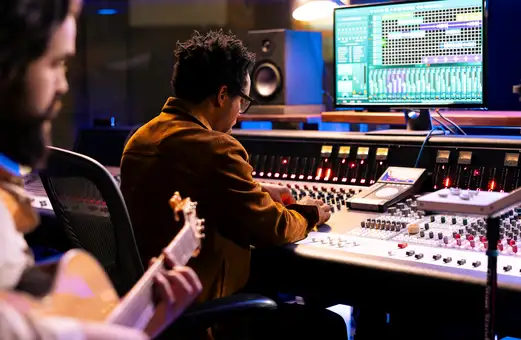Copyright in the music industry: the most important terms
Learn more about copyright in the music industry! In this blog post, we explain what you need to know to better understand the legal basics of copyright.
1. copyright & copyright music
Copyright is a legal protection for creative works and the people who created them.
Copyright law for music protects artists. It gives them the sole right to decide how their works are used, reproduced and distributed.
In contrast, copyright relates primarily to the economic interests of the rights holders. These do not have to be the same people as the creators.
Tip: You can find out more about this in our license agreement
2. license fee
A license fee is the amount paid for the use of a copyrighted piece of music. This fee is often an essential part of the remuneration for the use of creative works.
Here you can find the link to our price list
3. sampling
Sampling involves using excerpts from an existing piece of music in a new composition. It is important to obtain permission from the copyright holder to avoid legal conflicts.
4. fair use
Fair use is an exception in copyright law that allows copyrighted material to be used without the consent of the copyright holder - for example, for critical, educational or satirical purposes. However, this regulation does not apply in all countries, which is why local laws should be observed.
5 Creative Commons
Creative Commons is an organization that offers alternative licensing terms for creative works, including music. These allow creators to determine for themselves how their works may be used and shared.
6 Digital Rights Management (DRM)
A DRM is a technical protection system for the protection of copyrights in the digital domain. The aim of DRM is to control the use of digital music to prevent unauthorized distribution.
7. public domain
Public domain refers to the legal status of a work that is no longer subject to copyright restrictions. This means that the work is no longer protected by copyright and can therefore be used, copied, edited or distributed by anyone without restrictions. Works enter the public domain when the term of protection has expired or authors voluntarily waive their rights.
8. takedown notice
A takedown notice is an official letter. Copyright owners use it to request an online platform to remove a protected piece of music.
9 Digital Millennium Copyright Act (DMCA)
The DMCA is a US federal law that regulates copyright law specifically in the digital world. Among other things, the law contains provisions on takedown notices and protection against copyright infringements on digital platforms.
Find out more: Under the following link you will find everything you need to know about the legal basis for image rights.
Image rights - What must be observed?
With this overview, you have the best prerequisites for finding your way around copyright law!


